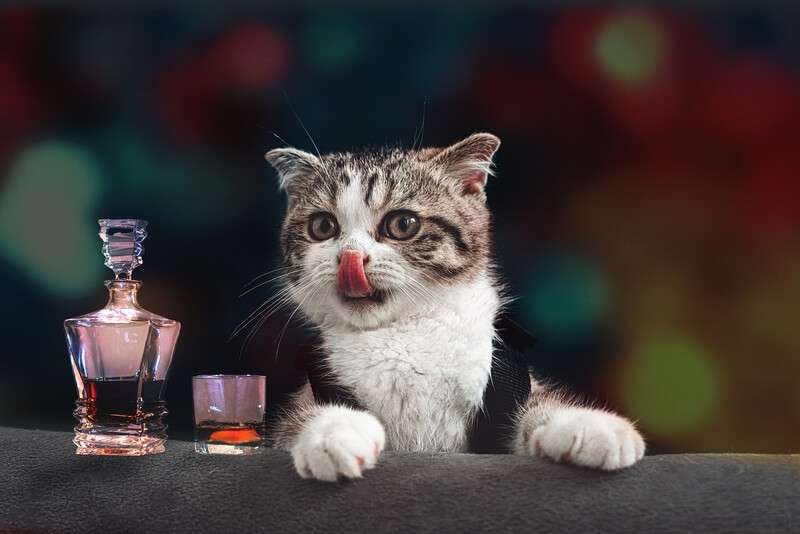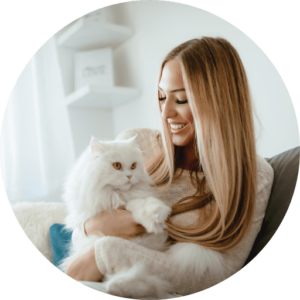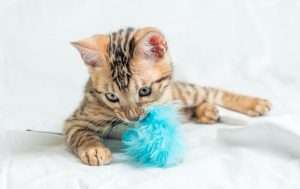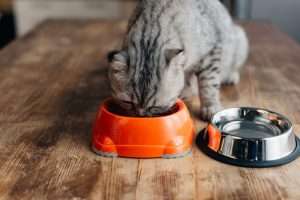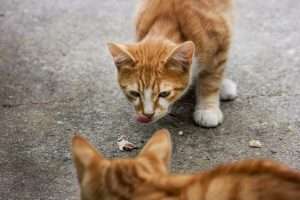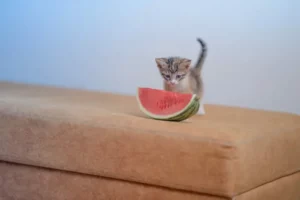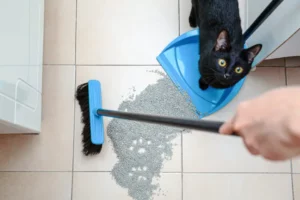Table of Contents
Can cats eat honey? The short answer is yes. Cats can eat honey, but only in small amounts. The maximum and safe part of honey for an adult cat is only a few teaspoons. As for the kittens, it is best to avoid giving them honey because it can create health problems.
Are you a cat lover who enjoys putting honey in your hot and cold beverages? You should be aware that honey is also suitable for our overall health and sweetening our beverages. But does this imply that honey is also beneficial to cats? Can cats consume honey? Are there any side effects?
So let’s find out the answers to the above questions. Move on.
Are you a cat lover who enjoys putting honey in your hot and cold beverages? You should be aware that honey is also suitable for our overall health and sweetening our beverages. But does this imply that honey is also beneficial to cats? Can cats consume honey? Are there any side effects?
So let’s find out the answers to the above questions. Move on.
Can cats consume honey?
Cats’ digestive systems work entirely different than those of dogs or humans. Because we are both omnivores, dogs, and humans can digest plant materials without difficulty. Cats are carnivores. Thus they are unable to metabolize the sugars found in honey. Despite being high in nutrients that can benefit human health, honey contains no valuable ingredients for your cat.
So, while a bit of honey won’t hurt your cat, it’s also not particularly good for them. Your cat will not benefit from consuming honey, but it may experience some unpleasant side effects if consumed in excess.
So, while a bit of honey won’t hurt your cat, it’s also not particularly good for them. Your cat will not benefit from consuming honey, but it may experience some unpleasant side effects if consumed in excess.

How frequently can a cat eat honey?
If your cat licks a small amount of honey now and again, it will not hurt him. However, honey should not be regularly included in your cat’s diet because it is unhealthy, and they dislike the taste.
Is there honey in commercial cat food?
No, commercial cat meals do not contain honey. Honey is high in sugar, which increases a cat’s chance of acquiring diabetes. Cats have no health benefits from honey, and they cannot taste sweet food.
Can cats digest honey?
On the other hand, Cats differ from humans in various ways. Kittens rely more on protein derived from meat. They do require fiber, although in far smaller amounts than humans. They also need the minerals, vitamins, and nutrients found in the flesh. However, unlike humans, their digestive systems cannot process the fructose and glucose found in honey.
Honey is not as harmful to cats as almonds, but its high fructose and glucose content makes it tough for cats to digest. Giving chocolates, sweets, candies, or maple syrup is not good. The more you offer, the more Cat Litter she will need. Furthermore, honey lacks the essential elements that your cats require regularly. It signifies that honey contains no proteins, fibers, or vitamins.
Honey is not as harmful to cats as almonds, but its high fructose and glucose content makes it tough for cats to digest. Giving chocolates, sweets, candies, or maple syrup is not good. The more you offer, the more Cat Litter she will need. Furthermore, honey lacks the essential elements that your cats require regularly. It signifies that honey contains no proteins, fibers, or vitamins.
Signs your cat has consumed honey
If your cat only ate a small bit of honey, they’ll be alright, and you won’t notice anything out of the ordinary. However, any amount of honey, especially a significant amount, might cause stomach distress. Vomiting, diarrhea, and stomach aches are frequent symptoms of your cat eating honey.
If a kitten consumes honey, they are in danger of contracting botulism because their immune systems are vulnerable to the bacterial spores in honey. The symptoms of this rare illness include lethargy, weakness, vomiting, diarrhea, loss of appetite, depression, dehydration, and paralysis. This is a dangerous and potentially fatal illness that requires immediate medical attention.
Consult your veterinarian if your cat has eaten honey and you observe any of these symptoms.
If a kitten consumes honey, they are in danger of contracting botulism because their immune systems are vulnerable to the bacterial spores in honey. The symptoms of this rare illness include lethargy, weakness, vomiting, diarrhea, loss of appetite, depression, dehydration, and paralysis. This is a dangerous and potentially fatal illness that requires immediate medical attention.
Consult your veterinarian if your cat has eaten honey and you observe any of these symptoms.

What happens when your cat consumes honey?
Most cats are alright if they consume a small amount of honey. They may, however, experience stomach trouble, including vomiting or diarrhea. This resolves typically with symptomatic therapy, which may involve an anti-vomiting injection at the vet and a temporary bland diet of plain cooked chicken or fish.
If a kitten consumes honey and develops botulism, immediate treatment is critical. Although this is a rare ailment, it is serious. The kitten will need to be hospitalized and treated with antibiotics, IV fluids, a feeding tube to supply critical nutrients, and oxygen therapy.
Cats can recover from botulism in a few days if treated promptly, but the prognosis can be poor if left untreated for too long, so contact your veterinarian if you think your cat has eaten honey.
If a kitten consumes honey and develops botulism, immediate treatment is critical. Although this is a rare ailment, it is serious. The kitten will need to be hospitalized and treated with antibiotics, IV fluids, a feeding tube to supply critical nutrients, and oxygen therapy.
Cats can recover from botulism in a few days if treated promptly, but the prognosis can be poor if left untreated for too long, so contact your veterinarian if you think your cat has eaten honey.
The side effects of offering honey to a cat
Honey is not healthy for cats due to its high sugar content. As a result, it has the potential to cause a variety of significant health problems.
Gastrointestinal problems
Cats digest food in quite different ways than humans. The stomachs of cats are not suited to absorb the fructose and glucose sugars found in honey. As a result, honey ingestion may result in the development of stomach discomfort. Remember that even humans have difficulty digesting honey. As a result, your cat may develop diarrhea and vomiting after consuming honey.
Diabetic cats are at a higher risk
Honey’s high sugar level can be fatal to our diabetic kitties. A lick of honey can cause an increase in blood sugar levels, resulting in uncontrolled diabetes.
Obesity
Honey is high in calories but has little nutritional value for our kittens. Giving honey to cats raises the likelihood of them becoming obese. It aggravates the condition of obesity in already obese cats in particular.
Botulinum Toxin
Raw honey frequently includes Clostridium botulinum spores, which can induce botulinum poisoning in cats, resulting in irreversible paralysis. This illness is relatively uncommon, however, the danger is higher in young kittens.
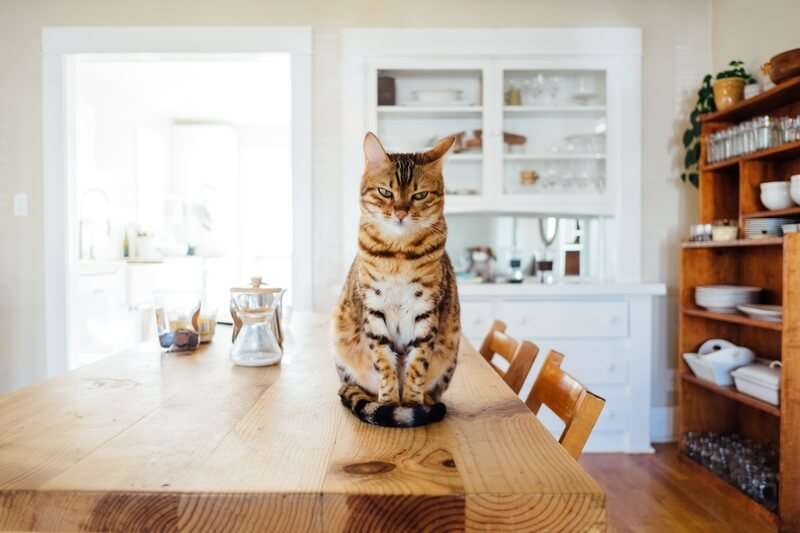
The Verdict
Because some experts advise against giving honey to cats, you should check your veterinarian before adding this much honey to your cat’s diet.
So, sure, your cats can eat honey because it is not poisonous to them. Consider how much you need to provide them to avoid issues.
Remember that they won’t profit from it the way we do, so exceeding the suggested serving sizes may put them in danger of that strange feeling in their stomachs.
Every cat is unique, and so is its connection with honey!
So, sure, your cats can eat honey because it is not poisonous to them. Consider how much you need to provide them to avoid issues.
Remember that they won’t profit from it the way we do, so exceeding the suggested serving sizes may put them in danger of that strange feeling in their stomachs.
Every cat is unique, and so is its connection with honey!
Similar to honey, ice-cream and almond are also attractive diet for cats. Is it safe for cats to eat Ice Cream? And, Is it safe for cats to eat Almond? Read our articles and find out more.


